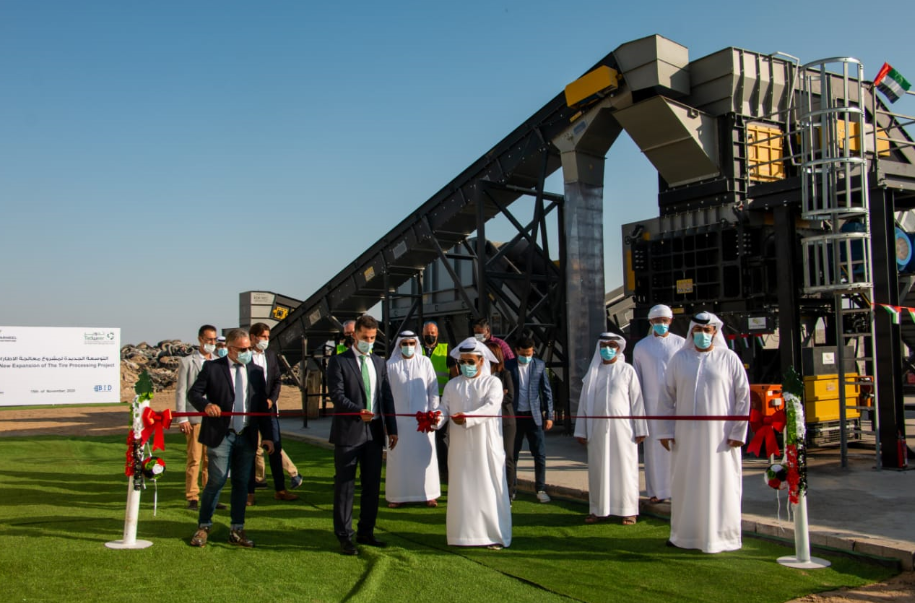Tadweer Opens Expanded Used Tire Recycling Facility in Abu Dhabi
Abu Dhabi Waste Management Center (Tadweer) announced the opening of its expanded used tire recycling facility in Abu Dhabi. Run in strategic partnership with the private sector, the facility aims to ensure the safe disposal of used tires to avoid public health and environmental risks.
To ensure the facility’s success, Tadweer has contracted with Tarheel Collecting Wastes LLC, an Abu Dhabi-based firm with over 10 years of extensive expertise in waste management and environment services.
Under its partnership with Tadweer, Tarheel collects and cleans used tires prior to their recycling and treatment at the dedicated facility. With a capacity to treat 70,000 tons of used tires annually, the facility has recycled nearly 17,000 tons of tires since the beginning of 2020 until the end of its third quarter. In collaboration with its Italian partner, Tarheel has set up a new integrated automated plant that has increased its total facility capacity to 100,000 tons annually.
In expanding its used tire recycling facility, Tadweer seeks to significantly reduce the health and environmental risks associated with burning tires which causes serious damage to water, soil, air and public health, and could lead to diseases such as asthma, cancer, allergies, etc. Furthermore, tire burning can have detrimental effects on the planet by driving global warming that has emerged as one of the most important environmental issues in recent years.
The disposal of used tires in landfills causes serious effects on environment as the rubber can take up to 1000 years to decompose due to its high sulfur content. This has prompted countries across the world to ban scrap tire from landfill with the European Union issuing legislations that include a complete ban on the landfill disposal of tires to protect public health and environment.
Recycling of scrap tires provides an excellent opportunity to use them as an alternative fuel in cement manufacturing. Scrap tires are used in cement kilns where they are burnt at high gas temperatures of 1000-1200 °C resulting in an instantaneous, complete, and non-smokeless tire combustion.
Tire-derived fuel (TDF) is more cost effective than fossil fuels, and helps preserve natural resources by reducing the dependence on fossil fuels. TDF allows cement manufactures to reduce emissions and production costs, turning scrap tires from an environment and public health challenge to an efficient source of alternative energy.
His Excellency Dr Salem Al Kaabi, Director General of Tadweer, said: “The opening of our expanded used tire recycling facility is aligned with Tadweer’s strategic objective of converting used tires from an economic burden into a valuable economic resource. In addition to reducing the adverse effects of scrap tires on public health and the environment, the expanded facility will go a long way in saving energy and cutting related costs.
“Tadweer is committed to stepping up collaboration with its partners from the government and private sectors to benefit from global expertise in the safe disposal of used tires to protect the environment from the adverse effects of harmful ingredients used in tire production. In addition to reducing pollution significantly, Tadweer’s approach in dealing with such materials has helped local market to source materials locally in line with the highest international quality and safety standards.
“Tadweer will continue to utilize the latest recycling technologies and global best practices to achieve its goal of safeguarding public health, preserving environment and supporting the sustainable development of Abu Dhabi, Al Kaabi added.
Tadweer is the key government entity responsible for all activities related to the development of waste management services in the emirate of Abu Dhabi, including the collection, transportation, treatment and disposal of waste in a safe, efficient and economical manner. The Center is also tasked with carrying out pest control, educating communities about the significance of protecting the environment, and encouraging them to adopt sound environmental habits to drive sustainable development.






















 Kuwaiti developer URC signs with Ahmadiah Contracting for the Commercial District development at Hessah AlMubarak
Kuwaiti developer URC signs with Ahmadiah Contracting for the Commercial District development at Hessah AlMubarak